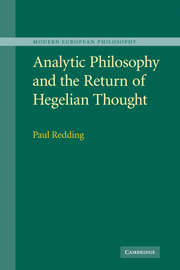Book contents
- Frontmatter
- Contents
- Acknowledgements
- Introduction: analytic philosophy and the fall and rise of the Kant–Hegel tradition
- 1 McDowell, Sellars and the myth of the perceptually given
- 2 Brandom, Sellars and the myth of the logical given
- 3 Individuation and determinate negation in Kant and Hegel
- 4 The Kantian route to Hegel's inferentialism
- 5 Aristotelian Phronesis and the perceptual discernment of value
- 6 Kant, Hegel and the dynamics of evaluative reason
- 7 Hegel and contradiction
- 8 Hegel, analytic philosophy and the question of metaphysics
- Bibliography
- Index
5 - Aristotelian Phronesis and the perceptual discernment of value
Published online by Cambridge University Press: 22 September 2009
- Frontmatter
- Contents
- Acknowledgements
- Introduction: analytic philosophy and the fall and rise of the Kant–Hegel tradition
- 1 McDowell, Sellars and the myth of the perceptually given
- 2 Brandom, Sellars and the myth of the logical given
- 3 Individuation and determinate negation in Kant and Hegel
- 4 The Kantian route to Hegel's inferentialism
- 5 Aristotelian Phronesis and the perceptual discernment of value
- 6 Kant, Hegel and the dynamics of evaluative reason
- 7 Hegel and contradiction
- 8 Hegel, analytic philosophy and the question of metaphysics
- Bibliography
- Index
Summary
In Mind and World, John McDowell invokes Aristotle's way of thinking about ethics to defend a form of naturalism within which a place can be found for the notion of a ‘responsiveness to meaning’ which avoids Platonic rationalist intuitionism. Our conception of nature needs to be broadened from being equated with the domain of objects of scientific investigation, the ‘realm of law’, as it is only against the backdrop of such an idea that we are tempted into the Platonistic conception of the space of reasons as sui generis. McDowell does not mention Moore, but would presumably have some sympathy for the critique of naturalism in ethics motivating Moore's turn to an intuitionist form of ‘moral realism’ in Principia Ethica. It would be Moore's conception of the choice involved, however, that would be seen as the problem: were one to start from a concept of nature as such a ‘realm of law’, then intuitionism – itself a version of the myth of the given – would present itself as the only alternative to the type of naturalistic ethics that they both oppose. McDowell's solution is to avoid either pole of this traditional debate – hence the need to reconceive the nature of ‘nature’.
- Type
- Chapter
- Information
- Analytic Philosophy and the Return of Hegelian Thought , pp. 145 - 174Publisher: Cambridge University PressPrint publication year: 2007



